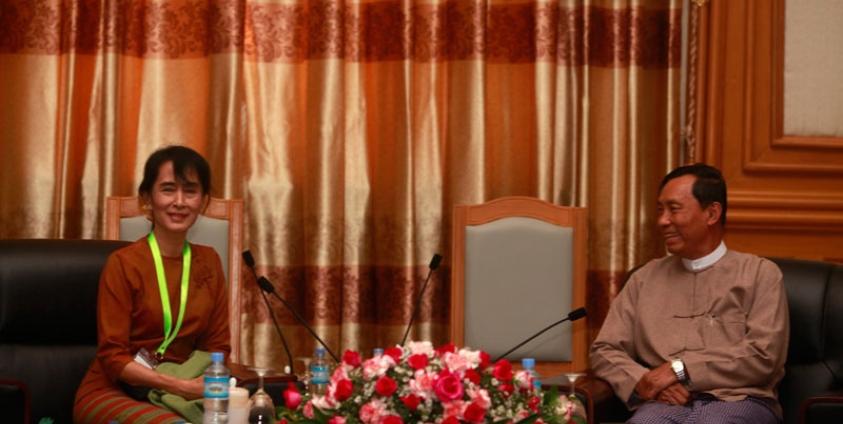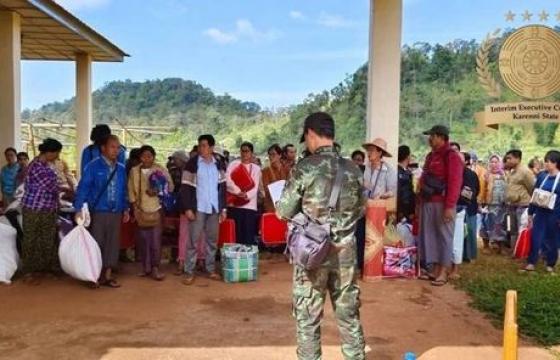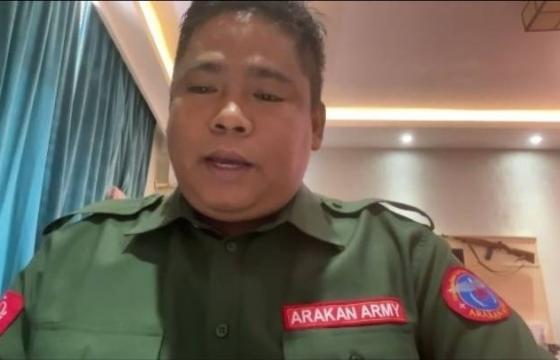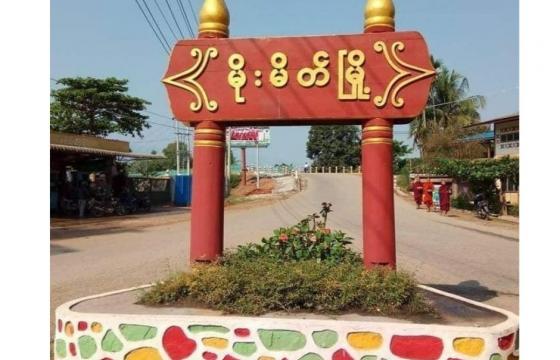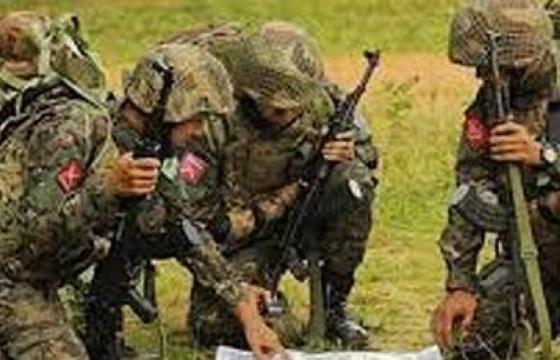The two biggest contenders in Myanmar’s upcoming elections, Aung San Suu Kyi’s National League for Democracy (NLD) and the governing military backed Union Solidarity and Development Party (USDP) recently caused surprise with their harsh treatment of prospective candidates.
In both cases it appears that the decisions were taken at the highest levels of the party without party members being consulted. Whereas such autocratic behaviour might be expected from the USDP, which was founded by the military junta, it is far more surprising to see it in a purportedly democratic organisation like the NLD.
It also seems that those at the top of both parties made the decisions they did to ensure that their members would be loyal to their leaders and to neutralize any threats to their leaders’ visions or dissenting voices.
At the beginning of the month when the NLD issued its list of candidates many people who were expected to stand as NLD candidates were omitted from the list.
The most high profile omission was probably Ko Ko Gyi, one of the leaders of the 88 Generation Peace and Open Society movement. He had been one of the student leaders in the 1988 uprising against the military junta and has since served 17 years in prison.
The uprising was a factor in persuading the junta to hold the elections in 1990 which brought Aung San Suu Kyi and the NLD to prominence when they won the elections by a landslide. Unfortunately the military were unprepared to cede power and they annulled the elections and put Suu Kyi under house arrest.
The 88 Generation Students never formed a political party, but they remained politically active and have been staunch and vocal supporters of the NLD for the last few years and those with parliamentary ambitions were expected to stand on an NLD ticket.
Many were surprised when, of the 17 members of the 88 Generation who applied to be NLD candidates, only Ko Pyone Cho was chosen as a candidate.
Other notable people unexpectedly rejected as NLD candidates were the Yangon University rector U Aung Thu, the famous blogger and former political prisoner Nay Phone Latt and Daw Nyo Nyo Thin, the popular MP for Bohan in the Yangon Regional Parliament.
Daw Nyo Nyo Thin expressed her surprise at the decision because she said that the NLD had asked her to apply to become a candidate and as a result she had rejected offers from five other parties.
She has said that she will stand as an independent against the NLD in her Bohan constituency, but that otherwise she will continue to support the NLD. Ko Ko Gyi has said he will not stand at the elections because he did not want to siphon off NLD votes, but he promised that at sometime in the future he would become an MP.
He said: “I will not contest the election but I will support the democratic forces and ethnic political parties.”
He is widely expected to fight in a by-election if a seat becomes vacant in the future.
But, it was not just high profile potential candidates that the NLD rejected. In many cases they rejected the candidate selections of local NLD branches, which angered many grassroots NLD members.
Critics said that the Central Executive Committee (CEC), which selected the NLD candidates, did not adhere to its own selection procedure and failed to consider the interests of local NLD officials.
In Pakkoku in Magway Division hundreds of NLD members protested and knocked down an NLD sign after their all of their eight suggested candidates for the four seats in the township were rejected by the NLD Central Executive Committee (CEC). In retaliation the NLD expelled 10 Pakkoku members for breaking rules. They included Daw Kyay Hmon, the former vice chair of Pakkoku District NLD who was expelled for giving a garland of roses to protesters.
There were protests by NLD members in other areas including Hlegu on the outskirts of Yangon where 100 disgruntled supporters gathered to express their dismay.
The USDP waited until late Wednesday evening (12 August) to prepare the party for the elections.
At about 10pm on Wednesday evening about 10 truckloads of police and army officers surrounded the USDP base in Nay Pyi Taw, while the party was having a meeting, to prevent anyone from leaving or entering.
At the same time security forces surrounded the House of the USDP chairman and Speaker of the lower house, Thura U Shwe Mann, who was not attending the USDP meeting.
At the USDP meeting Thura U Shwe Mann was removed from the chairmanship of the party and was replaced by U Htay Oo the party’s vice chairman and an ally of president Thein Sein.
On Thursday 13 August a USDP spokesperson said that Thein Sein had always been and still was the party chairman but, because constitutional rules forbid the president and ministers from also working for a political party Thura U Shwe Mann had only ever had the job on a temporary basis.
According to a USDP statement Thura U Shwe Mann was removed from the chairmanship because he was “very busy,” but he would continue to serve as the Speaker and as an MP and he is still a party member.
Prior to his removal Thura U Shwe Mann had publicly said he would be open to serving as president in the next parliament and he had been seen as a likely candidate for the job if the NLD won the elections, as Aung San Suu Kyi is constitutionally forbidden from taking the post.
He had cultivated ties with the NLD and got on well with Aung San Suu Kyi. He had also supported the NLD’s calls for constitutional reform.
Following these latest events it is very unlikely that Shwe Mann will become president.
President U Thein Sein and Thura U Shwe Mann are old rivals but it appears that Thein Sein and his faction were unwilling to take the risk that Shwe Mann might become the president.
On the surface it may seem that this was a power struggle between reformers and hardliners in the USDP. But, it is debatable whether Shwe Mann was truly a reformer or was just presenting himself as one so that he could grab the reins of power.
According to a Wikileaks cabel from 2007, even back then, he was considered a likely candidate to take charge and become Commander-in-Chief of the army, with the Wikileaks cable saying: “Most observers view General "Thura" Shwe Mann, the Burmese regime's number three, as Senior General Than Shwe's preferred successor.”
Even in 2007 some people were hoping that Shwe Mann might turn out to be a reformer, but the Wikileaks cable warns: “This could be nothing more than wishful thinking.”
The cable says he was complicit in human rights violations and says that in 1989: “Shwe Mann utilized forced civilian porters, including women and children, on a massive scale during operations against Karen insurgents.”
The cable also says that Shwe Mann organised the attack on Aung San Suu Kyi’s convoy in Depeyin in 2003 and that he “played a lead role in the arrest of Prime Minister Khin Nyunt and his military intelligence network.”
Looking at Shwe Mann’s record it seems that the recent maneuverings within the USDP could be less of a struggle between reformers and hardliners and more of an old fashioned struggle between rival factions within the army like we have previously seen in Myanmar.
According to party source the last straw for Thein Sein and his faction was when Shwe Mann selected only 59 out of 159 ex-army officers who had applied to be USDP election candidates.
Thein Sein consolidated his power by also removing Shwe Mann supporter Maung Maung Thein from his job as secretary general of the party and replacing him with one of his closest aides Tin Naing Thein.
Just in time for the 14 August deadline for candidate registration both the USDP and NLD leaders have ensured that all their candidates for election will be loyalists who will obey their orders.
Though the re-alignment of the USDP superficially seemed far more forceful and obviously aimed at drawing the party closer to the army the same could be said, to a lesser degree, of the re-alignments in the NLD.
It has long been known that Aung San Suu Kyi prefers compromise with the army rather than confrontation. Many of the more high profile candidates the party rejected, especially Ko Ko Gyi and the 88 Generation members could be seen as more hardline and less willing to cut deals with the army and cooperate with the army’s agenda.
Though the USDP‘s realignment seems the more brutal and premeditated Aung San Suu Kyi and the NLD CEC could also be seen to have operated in a brutal and calculating way.
If the NLD had told the rejected candidates of their fate earlier on they would have had time to form their own political parties or contest as independents. As it is the NLD only told them days before the candidate registration lists closed, which made it very hard, if not next to impossible, for them to contest the election
This means that influential popular people, such as Ko Ko Gyi, who could have fought against the NLD and taken seats from them, have been neutralized and denied the opportunity to contest the election.
One also wonders if the NLD’s candidate selection did not also affect the USDP’s decision to reorganize.
Thein Sein and his faction may have looked at the NLD candidate selection and decided that appeasing the army and making deals with them was the NLD’s main priority.
If the NLD had selected more hardliners maybe the USDP would have left Shwe Mann in place as he was seen as an ally of Suu Kyi and if he had been allowed to take the presidency maybe hardliners in the NLD would have been more likely to cooperate with the USDP.
As it is, Thein Sein and his faction may have calculated that, with supine NLD MPs who were more likely to follow Aung San Suu Kyi’s lead, the NLD would still be prepared to cooperate with the USDP whoever was in charge.
Though they did it in different ways both the leaders of the NLD and the USDP have very publicly stamped their authority on their respective parties in the run up to the elections.
The leaders’ wishes for conformity and the similarity of their thinking is evidenced in comments made by people close to both leaders.
U Soe Nyunt, a member of the NLD’s candidate selection team for Yangon said: “Finally, the party decided to select candidates who would follow party policy set by its leader, Daw Aung San Suu Kyi.”
Presidential spokesman Ye Htut, speaking in a personal capacity said of the USDP changes: “Any party will have to go about changes when its leadership deviates from the party’s policies.”

